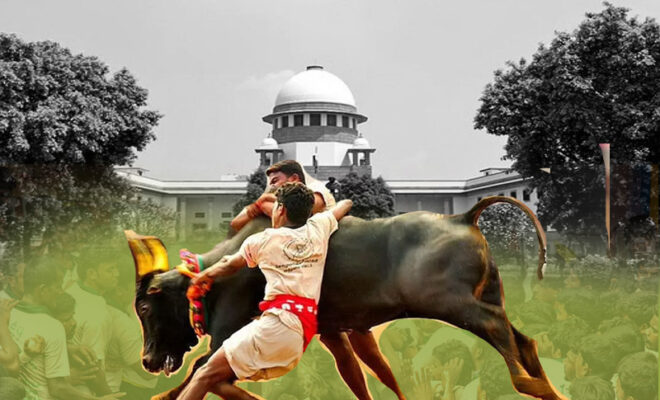SC Validates Jallikattu, No Objection For Cultural Heritage

Several foreign-funded organizations like PETA compare India’s Jallikattu with Spain’s Bulls Fight. But the real Jallikattu is totally different and harmless.
The Supreme Court of India has upheld the Tamil Nadu law allowing the traditional bull-taming sport known as ‘Jallikattu’.
The court stated that when the legislature has recognized Jallikattu as a cultural heritage of Tamil Nadu, the judiciary cannot hold a different opinion.
The verdict came in response to petitions filed by animal rights organization PETA challenging the state law protecting Jallikattu.
The court emphasized that Jallikattu has been practiced in Tamil Nadu for over a century and rejected the argument that it is not part of the state’s cultural heritage.
The court also acknowledged that the Prevention of Cruelty to Animals (Tamil Nadu Amendment) Act of 2017 has significantly reduced pain and suffering to animals during the sport.
A five-judge Constitution bench led by Justice K M Joseph affirmed that the legislature’s view should not be disrupted, especially when it declares Jallikattu as an integral part of Tamil Nadu’s culture and heritage.
The judgment emphasized that traditions involving animals cannot be permitted if they violate penal statutes.
The court dismissed all pleas challenging the validity of the laws allowing Jallikattu and bullock cart races in Tamil Nadu, Maharashtra, and Karnataka.
Jallikattu, also known as “Eruthazhuvuthal,” is a popular bull-taming sport primarily celebrated during the Tamil harvest festival, Pongal.
It holds cultural significance in Tamil Nadu, particularly in districts like Madurai, Tiruchirappalli, Theni, Pudukkottai, and Dindigul.
The court’s decision acknowledges Jallikattu as an inseparable part of India’s cultural heritage. The validation of Jallikattu by the Supreme Court has brought relief to supporters and enthusiasts of the sport.
The judgment underscores the delicate balance between preserving cultural traditions and ensuring the humane treatment of animals, marking a significant milestone in the legal recognition of cultural practices.
Myths Burst: What Is The Real Jallikattu?
Certain activist groups, often funded from abroad, have portrayed Jallikattu as a tradition that dates back over 5000 years. It is crucial to recognize that the age of the tradition is not the only factor to consider; the sport itself is harmless.
While it is true that commercial aspects have come into play, such as betting and the involvement of heavy money in some instances.
It is essential to note that the mistreatment of animals by some commercial entities to win at any cost, is not representative of the majority of villages where Jallikattu takes place.
For most communities, it is a joyful event that celebrates the animals, without harming them, which play a significant role in their daily lives, from food production to agriculture and economic processes.
It is crucial for urban dwellers to understand the importance of this sport in the rural context. Jallikattu is the only sport that villagers have the opportunity to participate in once a year.
It is essential to dispel the misconception that Jallikattu is a form of bullfighting. In reality, it is about embracing the bulls.
These bulls are prized animals that are not meant to be killed during the event. Instead, they are used for breeding purposes and for various tasks. The investment involved in raising these bulls is significant, and no one wants to squander it.
Jallikattu stands in stark contrast to bullfighting events in Spain, where numerous bulls are killed in a single afternoon.
Therefore, it is crucial to recognize that Jallikattu is a way of taming the bulls, rather than causing harm to them.
Unfortunately, misinformation and lack of understanding have led to controversy surrounding this ancient tradition. It is our responsibility to approach the topic with an open mind.
If opposing Jallikattu is driven by a genuine concern for humanity, that is one thing. However, if it stems from political activism without a comprehensive understanding of the sport, it is necessary to reconsider one’s stance.
Jallikattu is a simple sport that brings joy to the youth of Tamil Nadu. It is also a way of honoring the animals that play an integral role in the lives of the villagers.
Also Read:- Passengers injured as Air India’s Delhi-Sydney flight encounter severe turbulence
Until we can build a nation where every village has access to various sports facilities like football stadiums, boxing rings, and skating rinks, it is important to allow rural youth to engage in the simple games they have, such as Jallikattu.
Let us appreciate the cultural significance and the bond between humans and animals that Jallikattu represents.
By understanding the true essence of this ancient tradition, we can foster harmony and respect for all.



